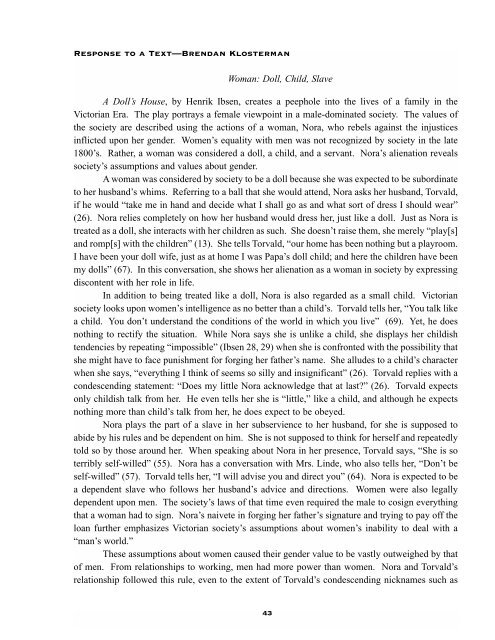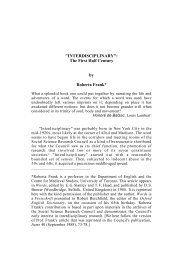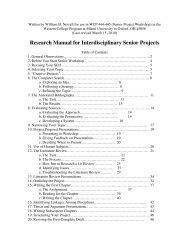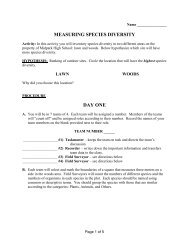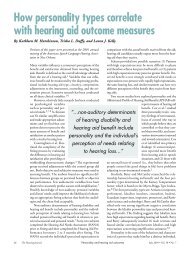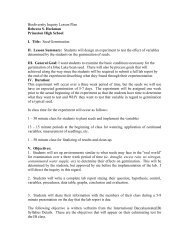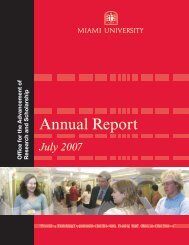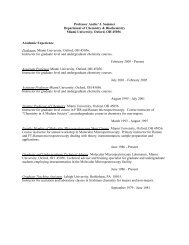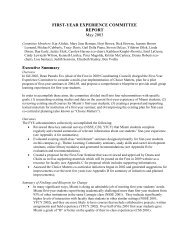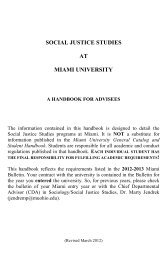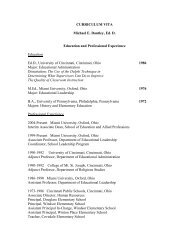Best of Miami Portfolios 2001 - Units.muohio.edu
Best of Miami Portfolios 2001 - Units.muohio.edu
Best of Miami Portfolios 2001 - Units.muohio.edu
Create successful ePaper yourself
Turn your PDF publications into a flip-book with our unique Google optimized e-Paper software.
Response to a Text—Brendan Klosterman<br />
Woman: Doll, Child, Slave<br />
ADoll’s House, by Henrik Ibsen, creates a peephole into the lives <strong>of</strong> a family in the<br />
Victorian Era. The play portrays a female viewpoint in a male-dominated society. The values <strong>of</strong><br />
the society are described using the actions <strong>of</strong> a woman, Nora, who rebels against the injustices<br />
inflicted upon her gender. Women’s equality with men was not recognized by society in the late<br />
1800’s. Rather, a woman was considered a doll, a child, and a servant. Nora’s alienation reveals<br />
society’s assumptions and values about gender.<br />
A woman was considered by society to be a doll because she was expected to be subordinate<br />
to her husband’s whims. Referring to a ball that she would attend, Nora asks her husband, Torvald,<br />
if he would “take me in hand and decide what I shall go as and what sort <strong>of</strong> dress I should wear”<br />
(26). Nora relies completely on how her husband would dress her, just like a doll. Just as Nora is<br />
treated as a doll, she interacts with her children as such. She doesn’t raise them, she merely “play[s]<br />
and romp[s] with the children” (13). She tells Torvald, “our home has been nothing but a playroom.<br />
I have been your doll wife, just as at home I was Papa’s doll child; and here the children have been<br />
my dolls” (67). In this conversation, she shows her alienation as a woman in society by expressing<br />
discontent with her role in life.<br />
In addition to being treated like a doll, Nora is also regarded as a small child. Victorian<br />
society looks upon women’s intelligence as no better than a child’s. Torvald tells her, “You talk like<br />
a child. You don’t understand the conditions <strong>of</strong> the world in which you live” (69). Yet, he does<br />
nothing to rectify the situation. While Nora says she is unlike a child, she displays her childish<br />
tendencies by repeating “impossible” (Ibsen 28, 29) when she is confronted with the possibility that<br />
she might have to face punishment for forging her father’s name. She alludes to a child’s character<br />
when she says, “everything I think <strong>of</strong> seems so silly and insignificant” (26). Torvald replies with a<br />
condescending statement: “Does my little Nora acknowledge that at last?” (26). Torvald expects<br />
only childish talk from her. He even tells her she is “little,” like a child, and although he expects<br />
nothing more than child’s talk from her, he does expect to be obeyed.<br />
Nora plays the part <strong>of</strong> a slave in her subservience to her husband, for she is supposed to<br />
abide by his rules and be dependent on him. She is not supposed to think for herself and repeatedly<br />
told so by those around her. When speaking about Nora in her presence, Torvald says, “She is so<br />
terribly self-willed” (55). Nora has a conversation with Mrs. Linde, who also tells her, “Don’t be<br />
self-willed” (57). Torvald tells her, “I will advise you and direct you” (64). Nora is expected to be<br />
a dependent slave who follows her husband’s advice and directions. Women were also legally<br />
dependent upon men. The society’s laws <strong>of</strong> that time even required the male to cosign everything<br />
that a woman had to sign. Nora’s naivete in forging her father’s signature and trying to pay <strong>of</strong>f the<br />
loan further emphasizes Victorian society’s assumptions about women’s inability to deal with a<br />
“man’s world.”<br />
These assumptions about women caused their gender value to be vastly outweighed by that<br />
<strong>of</strong> men. From relationships to working, men had more power than women. Nora and Torvald’s<br />
relationship followed this rule, even to the extent <strong>of</strong> Torvald’s condescending nicknames such as<br />
43


